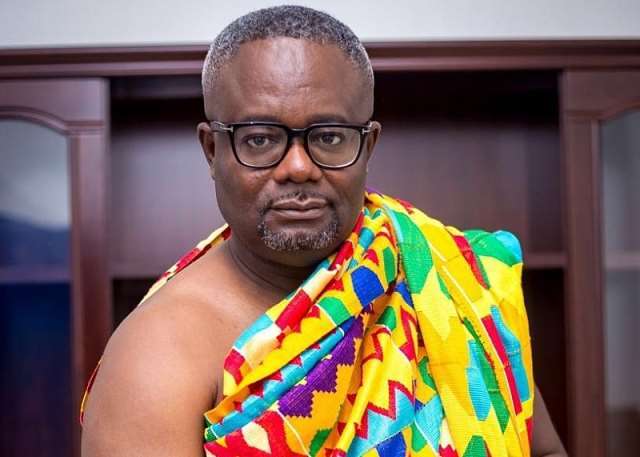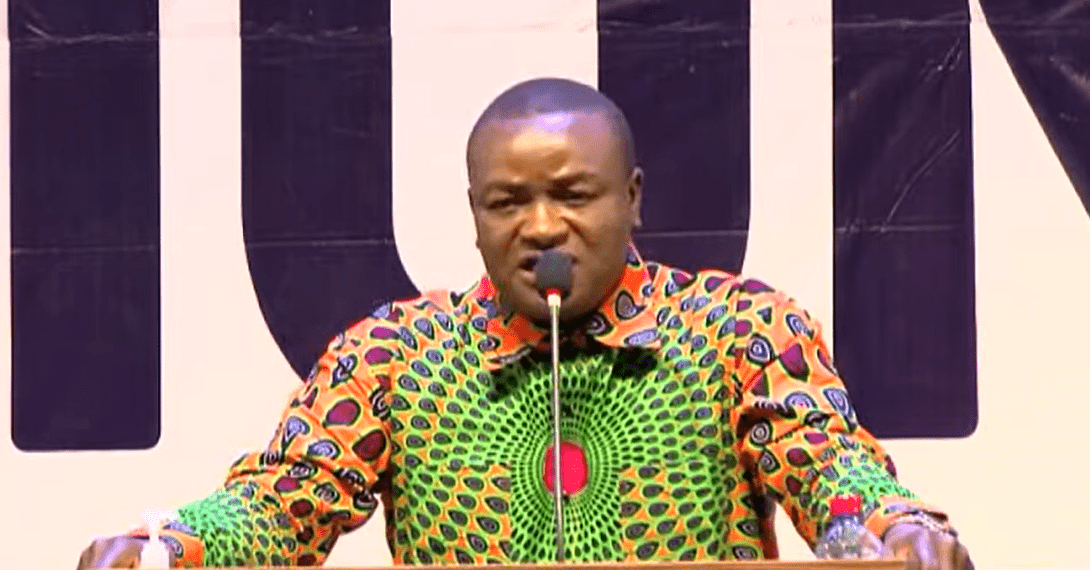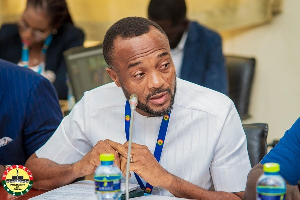The Presidential Candidate of the All-People’s Congress (APC) and the leader and founder of the Liberal Party of Ghana (LPG) Kofi Akploo has mounted a head-to-head presidential debate as to how each intend to run the Ghanaian economy when voted into power.
Hassan Ayariga, the presidential candidate of the All-People’s Congress (APC), laid out a detailed plan for addressing Ghana’s national debt. Hassan Ayariga’s proposal centered around reclaiming natural resources, increasing productivity, and reducing dependency on borrowing. His stance is clear: borrowing, especially for consumption, is a major contributor to Ghana’s economic challenges. He believes that through careful management of resources and renegotiation of existing debt, the country can pay down its debt and build a stronger economy. He pointed out that the country’s inability to pay off its debt has had severe consequences for citizens, including the controversial “haircut” on financial investments.
“In managing the Ghana national debt, what it means is that we have over 670,000,000,000 debt, and we are unable to pay, and because we are unable to pay, you remember the haircut that the Ghanaians have to go through.”
Hassan Ayariga the presidential candidate of the All-People’s Congress (APC)
Hassan Ayariga attributed the debt crisis to widespread corruption and mismanagement of the country’s resources. According to him, borrowing in itself is not the problem, but borrowing without a plan to invest in key economic sectors that can generate returns is what has led to the current situation.
“There’s been so much corruption in this country and waste of our resources. That is why you borrow and you’re unable to pay back. Borrowing means that you take money in order to invest in certain key economic sectors that will give you back the returns for you to pay.”
Hassan Ayariga the presidential candidate of the All-People’s Congress (APC)
Reclaiming Natural Resources and Increasing Productivity
One of the key components of Ayariga’s plan is to reclaim control of Ghana’s natural and mineral resources from foreign interests. He argues that foreign control of these resources has limited the country’s ability to maximize revenue and productivity. Under his leadership, Ayariga promises to take back control of these resources, allowing the government to increase revenue and reduce reliance on external debt.
“I intend to reclaim back our natural resources and mineral resources from foreigners. That is number one. Once we reclaim it and get the Ghana government to take control of it, we are going to increase revenue and productivity in our country.”
Hassan Ayariga the presidential candidate of the All-People’s Congress (APC)
Hassan Ayariga’s strategy is to use the increased revenue from these reclaimed resources to manage the country’s debt. He believes that by boosting productivity and ensuring that the government benefits directly from the country’s natural wealth, Ghana can gradually pay off its debt without needing to borrow more.
“When we are able to increase too much revenue and productivity in the country, we have enough resources to be able to maintain this country, manage this country well, and start paying our debt stock bit by bit.”
Hassan Ayariga the presidential candidate of the All-People’s Congress (APC)
In addition to increasing revenue, Hassan Ayariga emphasized the importance of renegotiating Ghana’s debt. He believes that a new government, under his leadership, could approach creditors to negotiate better terms, potentially leading to the cancellation of some of the debt.
“If President Mahama becomes president, our debt stock will not be canceled. If Bawumia becomes president, our debt stock will not be canceled. But if Hassan Ayariga becomes president, I will renegotiate with our debtors to be able to cancel off some of the debts we’re having because this is a new person, new government, new leader that is coming on board who wants to build his country and wants to be free of debt.”
Hassan Ayariga the presidential candidate of the All-People’s Congress (APC)
Hassan Ayariga is confident that his approach will allow Ghana to reduce its debt burden while maintaining economic stability. He positioned himself as a fresh leader who can convince creditors to support the country’s recovery efforts.
Rejecting Borrowing as a Policy
A significant part of Ayariga’s economic philosophy is his firm stance against borrowing. He expressed his belief that borrowing is a sign of weak economic management and a lack of business acumen. Drawing from his personal experience as a businessman, Hassan Ayariga emphasized that he has never borrowed money in his personal or professional life, and he does not intend to do so as president.
“The only person who goes to borrow is the one who does not have economic knowledge and basic knowledge of running a business. My whole life as a businessman, I’ve never borrowed. My life as a father, I’ve never borrowed. My life as a young man, I’ve never borrowed. My life as a student abroad. So my life as president, I will not borrow.”
Hassan Ayariga the presidential candidate of the All-People’s Congress (APC)
Hassan Ayariga believes that the government can generate enough income to manage the economy and pay down its debts.
“I will continue to invest in our productivity, in our production, manufacturing, industrial hub, to be able to create more jobs and more opportunities for our young men. So that we get enough revenue and taxes from our oil industry, from our marketing, and my manufacturing industry, from our production industry, from revenue coming from the ports and other things.”
Hassan Ayariga the presidential candidate of the All-People’s Congress (APC)
Hassan Ayariga was critical of the way past governments have borrowed money only to spend it on non-productive activities. He argued; “We cannot continue to borrow for wastage. We are borrowing for mismanagement. We are borrowing for consumption. We are borrowing for corruption. Borrowing is a canker for Ghanaian citizens.”
According to Hassan Ayariga, every Ghanaian now effectively owes over GHS100,000 as a result of the national debt. He believes that the country needs a new approach to debt management, one that focuses on paying off existing debt and avoiding future borrowing for non-productive purposes.
To tackle the debt crisis head-on, Ayariga proposed setting up a debt recovery fund. This fund would allow Ghanaians, including workers and citizens, to voluntarily contribute towards paying off the national debt. He argued that this fund would enable the country to gradually reduce its debt burden without placing excessive pressure on the economy.
“As of now, every Ghanaian owes over 100,000 Ghana cedis. So I’ll put up a debt recovery fund where Ghanaians, workers, and society will be able to pay back willingly, those who want to pay back their debts because everybody owes over 100,000 Ghana cedis. So under the APC, we will have a debt recovery restructuring fund so that we are able to pay our debts.”
Hassan Ayariga the presidential candidate of the All-People’s Congress (APC)
Hassan Ayariga’s plan for managing Ghana’s national debt involves a combination of reclaiming natural resources, increasing productivity, renegotiating debt, and rejecting further borrowing.
He believes that by focusing on revenue generation and careful management of resources, Ghana can pay down its debt and build a stronger, more self-sufficient economy. His proposal includes the creation of a debt recovery fund, which would allow Ghanaians to contribute towards the country’s financial recovery. Hassan Ayariga’s vision is one of financial independence, where borrowing is no longer necessary, and the country’s resources are used to benefit its citizens directly.
Kofi Akploo outlines vision
However, Kofi Akpaloo, the presidential candidate of the Liberal Party of Ghana (LPG), shared his views on Ghana’s national debt and how to manage it without stifling development. In his statement, Akpaloo presented an optimistic outlook on the country’s debt situation, emphasizing the need to borrow strategically and invest in productive sectors rather than fearing debt accumulation. Kofi Akpaloo began his argument by putting the country’s debt in perspective.

“This amount involved is a peanut. You, 742,000,000,000 cedis, equivalent of 70.6% of our GDP. When you bring it to dollars, it will be about $50 billion. It’s peanut, it’s not money that we should worry ourselves as a people because we will be able to generate more than that if we do our things right.”
Kofi Akpaloo the leader and founder of Liberal Party of Ghana (LPG)
He emphasized that with proper fiscal discipline and targeted investments, Ghana’s economy could grow significantly enough to generate the revenue needed to service its debt.
Kofi Apkaloo highlighted the importance of leveraging debt to create wealth, especially in a growing economy like Ghana’s.
“If you listen to all the other competitors, they are saying that when they come, they will not borrow. They don’t understand borrowing. When you run a business, we have what we call leveraging—smaller equity, higher debt. Don’t run a business with equity because equity is very expensive. You have to use debt.”
Kofi Akpaloo the leader and founder of Liberal Party of Ghana (LPG)
Kofi Akpaloo explained that in business and governance, borrowing money can be a powerful tool if used wisely. He encouraged a shift from viewing borrowing as purely a liability and proposed that it should be embraced as a means to fund valuable investments.
Borrowing for Investment, Not Consumption
Kofi Akpaloo stressed the importance of borrowing money for investment, not for spending on recurrent expenses.
“What you borrow money for is the most important thing. If you borrow money to spend, you are wasting the money. But when you borrow to invest, you make something out of it. Assuming you borrow $10 billion and we invest in the production of aluminum, in the production of lithium, you are adding value to them. Your oil, you are producing, you are adding value to it, your cocoa beans, you’re adding value to them.”
Kofi Akpaloo the leader and founder of Liberal Party of Ghana (LPG)
This approach, Kofi Akpaloo said, would ensure that borrowed funds are not wasted, but instead generate significant returns that can be used to repay the debt.
In a direct critique of his political opponents, Kofi Akpaloo questioned their promises to stop borrowing. He argued that such promises are not only unrealistic but also demonstrate a lack of understanding of how economies grow.
“I’ve been hearing NPP, NDC, all the other, even my brother APC, they always say that when they come, they will not borrow. What are you coming to do? You have to come and add value to our natural resources… But you need money to do that.”
Kofi Akpaloo the leader and founder of Liberal Party of Ghana (LPG)
Kofi Akpaloo’s stance was clear: borrowing is not the problem. Rather, it is how the money is used that matters. He urged his opponents to reconsider their positions and focus on creating sustainable growth through investment in Ghana’s natural resources.
Job Creation and Youth Empowerment
A significant part of Akpaloo’s economic strategy involves empowering Ghana’s youth. He emphasized the need to borrow and invest in the ideas and businesses of young Ghanaians, who he believes hold the key to the country’s future economic growth.
“We are going to borrow money to invest in the economy, to create jobs, and to create wealth for Ghanaians. We have a plan to set up a $10 billion job fund so that our young people who are coming from universities and polytechnics will be given the needed support to start their own businesses here right here.”
He drew parallels with successful entrepreneurs around the world, noting that many of the world’s largest companies were founded by young people with innovative ideas.
“If you go to America or you go to Europe, you see all the big businesses that you see around, all started by young people. Take Microsoft, started when Bill Gates was 19. Take Apple Corporation, Steve Jobs and Steve Wozniak started when they were both 21 and 24. Even all the big companies you can think of, they started by young people.”
Kofi Akpaloo the leader and founder of Liberal Party of Ghana (LPG)
By investing in young people’s ideas, Akpaloo believes that Ghana can replicate the success of these global businesses and significantly boost its economic growth. Kofi Akpaloo’s economic plan for managing Ghana’s debt involves strategic borrowing, targeted investment, and youth empowerment. He dismissed the notion that the country’s debt is insurmountable and advocated for borrowing to fund productive ventures that would create jobs, grow the economy, and ultimately pay off the debt. For Kofi Akpaloo, the key to Ghana’s future prosperity lies in leveraging its natural resources and the innovative potential of its youth.
READ ALSO; Sonnie Badu Opens Up On Battling Depression in the US





















